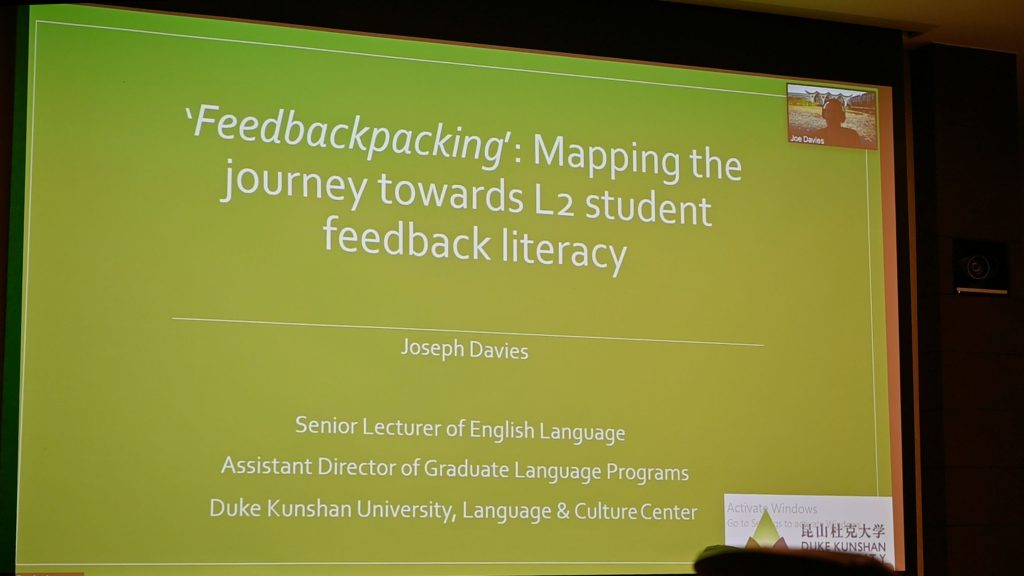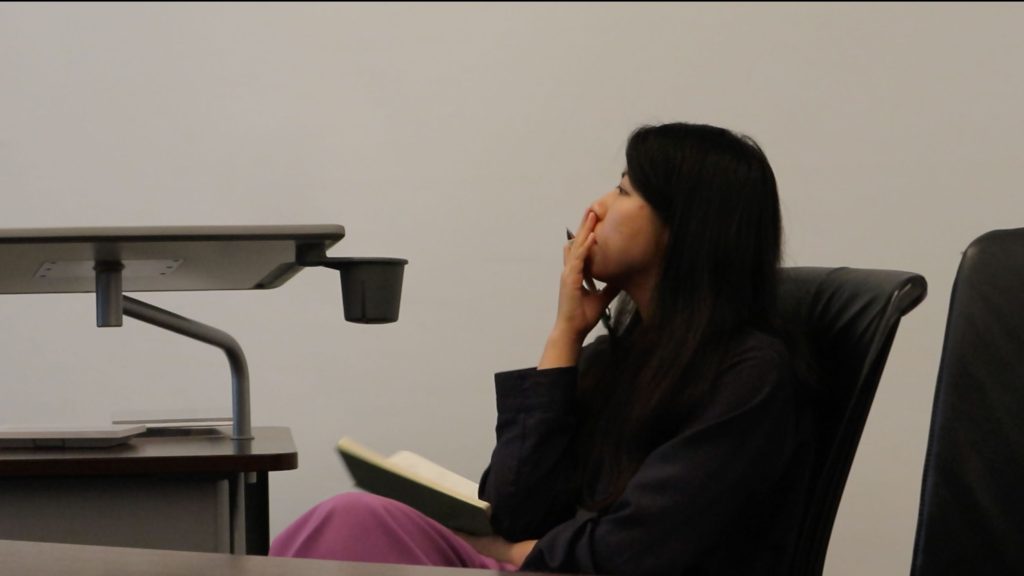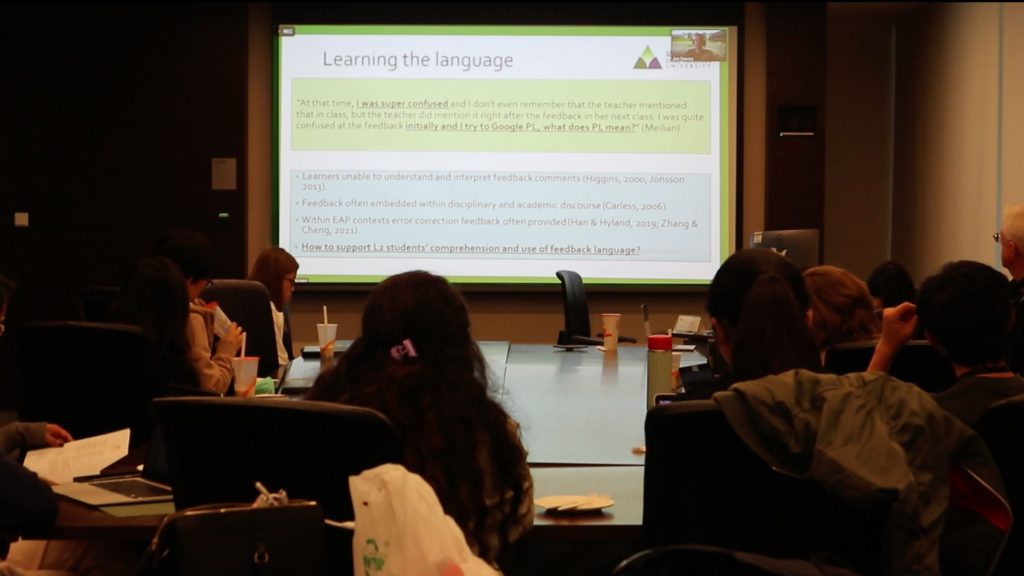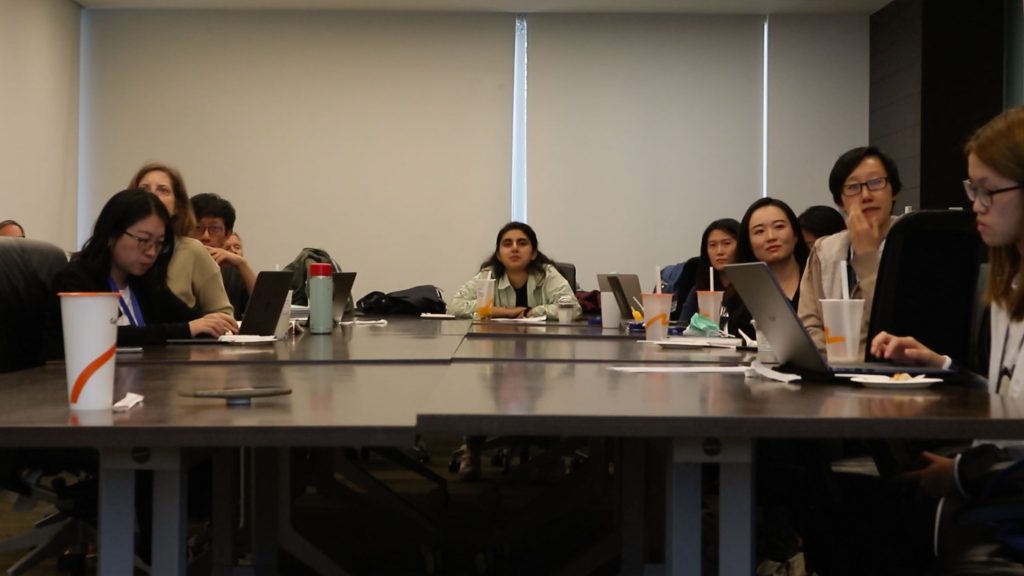Reported by Vicky Yongkun Wu, Class of 2026.
This research talk is part of the Third Space Lab Brown Bag Lunch Research Talk presented by the Humanities Research Center. The program is broadly associated with research projects related to languages, cultures, and intercultural communication.
 Joseph Davies is a senior lecturer of English language and assistant director for graduate English for Academic Purposes at Duke Kunshan University, China. During a research talk on October 28th, 2022, Prof Davies introduced his research on feedback literacy among L2 learning students. Based on the fact that students and teachers are generally dissatisfied with the feedback practice, he explored ways of improving the situation in a productive manner.
Joseph Davies is a senior lecturer of English language and assistant director for graduate English for Academic Purposes at Duke Kunshan University, China. During a research talk on October 28th, 2022, Prof Davies introduced his research on feedback literacy among L2 learning students. Based on the fact that students and teachers are generally dissatisfied with the feedback practice, he explored ways of improving the situation in a productive manner.
To give the audience a general understanding, Prof Davies organized the talk in five parts, general feedback assumptions, importance and challenges, methodology, results and implications, and the Q&A session.
Prof Davies invited the audience to engage in the discussion by proposing familiar assumptions about feedback. Common assumptions included the definition of feedback, students’ roles and challenges in the feedback practice, and the possible feedback support students receive. These questions opened the ground for Prof Davies’ deeper talk and the audience’s discussions during the Q&A session.
 In regards to its importance, Prof Davies introduced Carless and Boud’s (2018) definition of feedback: “A process through which learners make sense of information from various sources and use it to enhance their work or learning strategies.” The goal is to help learners improve their future work through constructive feedback. Despite the ideal goal of feedback literacy, it faces numerous real-life challenges, which hinder feedback to exert its positive influence in L2 learning. In reference to Evans and Price et al., Prof Davies concluded that possible obstacles could lie in students and teachers’ different views on feedback which results in negative learning as well as students’ lack of engagement and time commitments.
In regards to its importance, Prof Davies introduced Carless and Boud’s (2018) definition of feedback: “A process through which learners make sense of information from various sources and use it to enhance their work or learning strategies.” The goal is to help learners improve their future work through constructive feedback. Despite the ideal goal of feedback literacy, it faces numerous real-life challenges, which hinder feedback to exert its positive influence in L2 learning. In reference to Evans and Price et al., Prof Davies concluded that possible obstacles could lie in students and teachers’ different views on feedback which results in negative learning as well as students’ lack of engagement and time commitments.
 In response to the dilemma, Prof Davies proposed an inspiring term, “feedbackpacking,” referring to the process that second language (L2) higher education (HE) learners go through and the mindset that they must adopt in order to become successful independent users of feedback. To illustrate this concept, he applied an analogy of traveling. Compared to the old paradigm of touring led by a guide, without the need to actively engage in independent planning and exploration, Prof Davies argued that it is the new paradigm of autonomous traveling that authentically enriched his personal experiences and skills. He suggested that L2 learners take the independent backpacking approach in their feedback literacy by viewing it as a long-term, constructive, and autonomous process.
In response to the dilemma, Prof Davies proposed an inspiring term, “feedbackpacking,” referring to the process that second language (L2) higher education (HE) learners go through and the mindset that they must adopt in order to become successful independent users of feedback. To illustrate this concept, he applied an analogy of traveling. Compared to the old paradigm of touring led by a guide, without the need to actively engage in independent planning and exploration, Prof Davies argued that it is the new paradigm of autonomous traveling that authentically enriched his personal experiences and skills. He suggested that L2 learners take the independent backpacking approach in their feedback literacy by viewing it as a long-term, constructive, and autonomous process.
For methodology, Prof Davies invited seven EAP (English for Academic Purpose) students from a Sino-foreign university where English (second language) is the medium of instruction to conduct 45-minute semi-structured interviews. In addition, utilized Endnotes and other methods to facilitate data analysis.
 Based on students’ interviews, Prof Davies concluded the importance of appropriately matching up pairs so as to reduce anxiety and address the problem of teachers’ inconsistency of feedback styles and students’ entrenched reluctance to receive critical feedback. Implications of the research are helpful for improving feedback literacy. For instance, Prof Davies believed that it is indispensable to pair students properly and guide students through providing feedback, allow room for students’ cultural adaptation in feedback practice, and customize feedback according to students’ language levels. In conclusion, Prof Davies insisted that in order to improve the dissatisfying status quo of feedback literacy, it is key to apply “feedbackpacking” and practice the new paradigm.
Based on students’ interviews, Prof Davies concluded the importance of appropriately matching up pairs so as to reduce anxiety and address the problem of teachers’ inconsistency of feedback styles and students’ entrenched reluctance to receive critical feedback. Implications of the research are helpful for improving feedback literacy. For instance, Prof Davies believed that it is indispensable to pair students properly and guide students through providing feedback, allow room for students’ cultural adaptation in feedback practice, and customize feedback according to students’ language levels. In conclusion, Prof Davies insisted that in order to improve the dissatisfying status quo of feedback literacy, it is key to apply “feedbackpacking” and practice the new paradigm.
During the Q&A sessions, teachers and students joined the discussion. Meaningful topics include whether it is helpful to provide feedback on students’ final papers and how teachers can encourage students to apply the feedback in their future learning instead of focusing merely on the grades.
